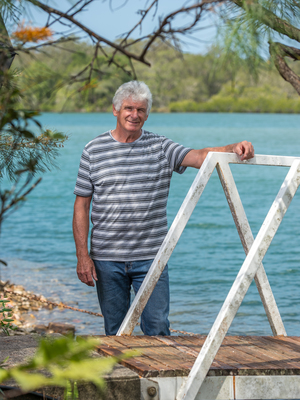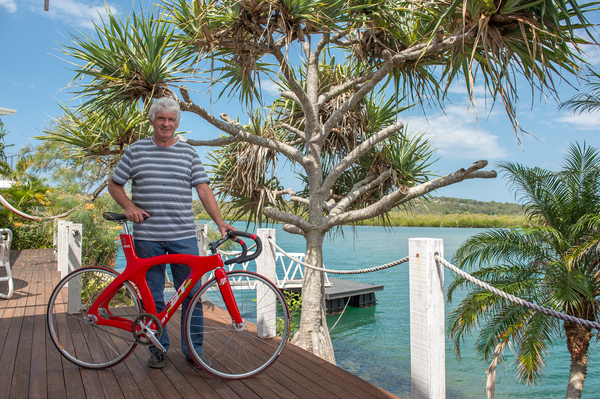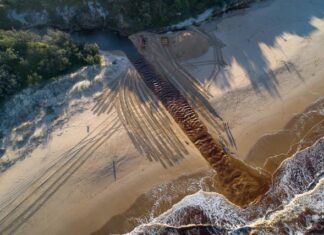By Hollie Harris
It was a mild sunny day and as we sat under the umbrella outside a Tewantin shop and drank our coffee, it became quite obvious to me that the gentleman sitting opposite was indeed a man who had taken life by the ears and hung on for the ride.
Here was a man of 70 years who, as an 8-year-old watching the Melbourne Olympics, decided there were two goals in life. One was to become an Olympian and the other was to fly.
Now in this sunny October morning of 2017, Ron Boyle has achieved his goals.
First was the Olympics. This came about in 1976 when after winning the Australian Sprint title as a cyclist, he was selected to represent his country in Montreal, Canada for that year’s Olympic Games.
This was definitely the highlight of his sporting career. However, it was also to become a great learning curve regarding advancement in the world of international sport.
Perhaps the climax of his flying career came in the late 1980s when he was to have several chilling experiences of flying through typhoons while employed as a commercial airline pilot for Cathay Pacific based in Hong Kong.
Born in Bendigo in 1947, Ron was educated at the Coburg Primary School then following this, Coburg State High.
“Living in Coburg we were virtually raised within the shadows of the notorious Pentridge Jail – naturally a lot of locals were not happy to connect to this name, so people were careful to mention the name Coburg,” he said with a laugh.
Leaving high school, Ron enrolled in the Melbourne University to study engineering. However after a short time he took what was to be his first step in achieving one of his life ambitions, when in 1968 he received a cadetship with TAA – this would enable him to learn to fly the big ones.
Prior to this he had received a scholarship at university, and used some of the money to continue learning to fly, so by the time of the TAA cadetship he had chalked up some nineteen flying hours. This was to be a big help in his new career.
This was to be the beginning of a twenty-year relationship with TAA – a relationship that was to cement his love of flying.
During his mid-teens he had started running, but after watching his mates racing bikes he too started to ride.
At 15 he followed this by joining the Coburg Cycle Club, and for the next 17 years was to remain a member.
In this time he covered all aspects of competition, sprinting, track, road and endurance.
“I took part in all, but for me the big attraction was sprinting – it really grabbed me. Over the years the love of cycling really took hold and it was to become a big thing in my life. Apart from the challenge of competition I found that during my cadetship with TAA, a good session of training on the bike was indeed a great relief from the stress of flying and study.”
For this young man, life on the bike had definitely become something of a two-way venture. One was the relief from stress and the second was his success in the world of competition. The latter was to lead to his selection in the Australian team for the Olympic Games.
The Olympics was without a doubt one of his life’s great achievements – but getting there was not easy.
“When I decided to get serious I indulged myself in a tough training regime. Weather permitting it involved six days a week – five with set routines and Sunday was a long slow ride. But for me my best move was when at 18 years of age I approached Harry Shaw and asked him to coach me.
“This was a relationship that was to last my entire career. When we met he was 36 and had competed at state and national level. In fact Harry held the record for the fastest time from Melbourne to Shepparton for many years, a truly great achievement. He was then well on his way to becoming a coach of renown.”
The year 1973 was indeed a major year for Ron – two occasions that he will never forget.
That year he won his first ever national medal when he won bronze at the titles in Hobart and the other was the loss of his father at the young age of 50 years.
“We were very close, I was devastated. However I knew I had to control it and move on; it wasn’t easy but I did. Then I was named in the training squad for the ’74 Commonwealth Games; however after a while I knew I just wasn’t mentally set so I withdrew. I had a break for two and a half years, came back in ’75 and won the national sprint in ’76; this qualified me for the Canadian Olympics. It was a dream come true.”
However, for not only Ron but the entire Australian team, the Games were something of a disaster.
“Our medal tally was an embarrassment – from a team of 200 athletes we came home with just one silver and three bronze medals. We knew there had to be major changes in everything. All training and coaching had to be reviewed, but in particular the administration team definitely needed a 100 per cent change of attitude, and above all selection criteria had to be addressed.”
For the open inquiring mind, there will always be some positives amongst the negatives; and for Ron there were two definite positives from the ’76 Olympic tragedies.
The first was that his sister Raelene carried the Australian flag at the opening ceremony and second was his further association, that was to last for years, with the legendary Australian sports medico Dr Howard Toyne.
“Doc Toyne (CBE, Hall of Fame and former member of the Noosa Heads SLSC) was one of the few who gave the athletes his total support – and we never forgot it. In the years ahead he did great things for Australian cycling. He was one in a million.
Luckily for us, Prime Minister Malcom Fraser got behind the movement for change and a lot of changes occurred. One was the commencement of the establishment of the Australian Institute of Sport, a vital step in the right direction.”
Then came his selection in the 1978 Commonwealth Games in Edmonton. This resulted in his winning a bronze medal when he teamed up with Stephen Goodall in the Men’s Tandem.
After finishing a 20-year career with TAA, Ron continued his love of flying, when in 1988 he joined Cathay Pacific.
As a result, he found himself based in Hong Kong; a base that was to become his home for the next 13 years. This change put him in the seat of different types of air craft and this involved more study, a study of the basic engineering aspect of the planes.
“Also,” he added with a laugh, “flying into Hong Kong was definitely different, as people who have visited would know.”
While working in Hong Kong and after a 10-year break from cycling, I started back on the bike with early morning rides for fitness. However I found I still had the bug and began to compete in the Masters.” And compete he did!
After arriving back in Australia he settled in Noosa and his involvement in the sport was again full on.
“While on leave from Cathay in ’94, I visited Noosa for the triathlon and while doing so invested in land and now here I am. Retired and happy.”
His involvement in Masters Competition has been nothing short of sensational. He has over a period of eight years won ten World Masters Titles as well as many Australian Nationals.
Perhaps the major achievements would be in 2007 World titles, 60-64 age division; four gold medals, being named Champion of Champions in his age group and World Masters Team of the Year For All Sports. Add to this, being named Australian Masters Athlete of the Year for All Sports. Indeed a year to remember.
Like many great champions he believes in putting back into the sport. This he does by coaching youth and fellow masters. Now two of his cyclists achieving big things are Jake van der Vliet, age 19 of Buderim, and Kaden Groves age 18 of Maroochydore – young men starting to draw attention.
From his days as a rookie cyclist to the Olympic Games: from flying light aircraft to flying as the captain on Boeing 747, Airbus A330 and Airbus A340 aircraft, with up to 460-plus souls on board, he is definitely living life to the fullest.
This was the life chosen by Ron Boyle. Definitely-a life of high achievement and personal satisfaction.









